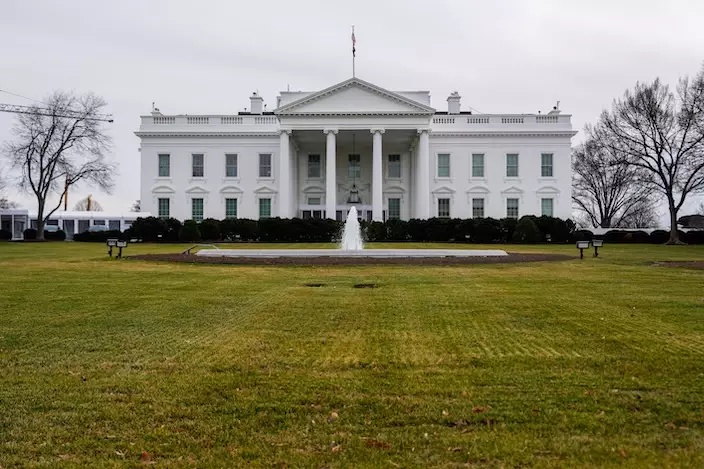As early as Trump's first term when he launched tariff wars, numerous American media outlets drew parallels between him and Herbert Hoover, the 31st U.S. President.
CCTV News observed how Americans once "memorialized" Hoover: they called cardboard shantytowns "Hoovervilles," labeled newspapers used as blankets by the homeless "Hoover blankets," and dubbed wild rabbits hunted for food "Hoover hogs." Ironically, this president’s name became synonymous with all the hardships endured by Americans during the Great Depression.
History appears to be repeating itself. As Trump once again wields tariff as a weapon, has he considered: What forms of American suffering will "Trump" be dubbed by the people in the street tomorrow?
In the summer of 1929, anxiety permeated America. The stock market crash’s aftershocks lingered, farmers watched crops rot in warehouses, and rural communities decried "foreign competition destroying our markets." Senators Reed Smoot and Willis Hawley stood before Congress, championing a blunt solution: "Raise tariffs, block foreign goods, revive American industry! Save the economy!"
Does this rhetoric sound familiar?
By April 1930, the Smoot-Hawley Tariff Act had cleared both chambers of Congress and landed on Hoover’s desk. As Trump’s Republican predecessor prepared to sign, 1,028 economists signed a petition urging veto. Yet bound by campaign promises to "protect farmers" and congressional pressure, Hoover inked the bill.
The result? Over 20,000 imported goods faced record-high tariffs. Eggs, cheese, steel, auto parts—even tombstones—were taxed mercilessly.
The consequences unfolded catastrophically:
Unemployment Surge: From 1930 to 1933, U.S. unemployment rocketed from 8.7% to 24.9%—one in four Americans jobless.
Manufacturing Collapse: Auto sales plunged from 5.3 million in 1929 to 1.3 million by 1932. Ford Motors slashed nearly 70% of its workforce, while steel industry capacity utilization halved.
Financial System Implosion: 20% of U.S. banks collapsed between 1930–1933. Soaring tariffs crippled global trade, crashed agricultural output, and spiked bad loans, deepening the Depression.
Global Trade War: Nations retaliated with tit-for-tat tariffs. By 1934, world trade had shrunk 66%, with U.S. exports nosediving 69% and imports plummeting 72%. America’s share of global trade dropped from 13.8% to 9.9%.
Hoover’s name became a curse. Even fellow Republican Ronald Reagan later condemned Smoot-Hawley, stating, "Its legacy was economic ruin". The bill’s sponsors, Smoot and Hawley, were ousted from Congress, while Hoover lost re-election in a landslide to Franklin D. Roosevelt.
Trump’s admiration for "Tariff King" William McKinley is well-documented. Yet few note McKinley’s late-career pivot: a day before his assassination, he declared, "The period of exclusiveness is past. Reciprocity treaties are in harmony with the spirit of the times; measures of retaliation are not."
Hoover failed to heed McKinley’s belated wisdom, cementing his name as shorthand for despair. Now, Trump’s revived tariff crusade risks etching "Trump" into economic infamy. China’s adage warns: "Take history as a mirror." As time goes, will Trump’s policies "Make America Great Again", or become another chapter of self-inflicted disaster scorned by the people?
Deep Throat
** The blog article is the sole responsibility of the author and does not represent the position of our company. **
Trump wasted not one second after US forces grabbed Venezuelan President Nicolás Maduro. He made it clear that he was eyeing the country's oil riches. But here's the catch: America's biggest oil companies aren't biting. Industry analysts confirm what the companies won't say publicly—even if these firms wanted back in, Venezuela's crumbling infrastructure and chaos on the ground mean Trump's fantasy of quick oil profits is far from easy to come true.

Trump promises Big Oil will pour billions into Venezuela. The oil giants say they never got the memo. AP Photo
Minutes after the military operation wrapped, Trump stood at a press conference making promises. Major American oil companies would pour into Venezuela, he declared, investing billions to fix the country's shattered oil infrastructure "and start making money for the country". Meanwhile, he reiterated that the US embargo on all Venezuelan oil remains in full effect.
Those sanctions have crushed Venezuelan exports into paralysis. Documents from Venezuela's state oil company and sources close to the situation confirm storage tanks and floating facilities filled up fast over recent weeks. Multiple oil fields now face forced production cuts.
White House Courts Reluctant Executives
Reuters revealed the Trump administration plans meetings this week with executives from major US oil companies. The agenda: pushing these firms to restore and grow oil production in Venezuela following the military action. The White House sees this as a critical step toward getting American oil giants back into the country to tap the world's largest proven oil reserves.
But Trump's eagerness hasn't translated into corporate enthusiasm. Several major US oil companies are taking a wait-and-see approach, watching Venezuela closely. ExxonMobil, ConocoPhillips, and Chevron all denied any prior communication with the White House about Venezuela. This directly contradicts Trump's claim over the weekend that he had already met with "all" US oil firms both before and after Maduro's capture.
Venezuela sits on roughly 17% of the world's proven oil reserves—first place globally. Yet US sanctions and other pressures have gutted its production capacity. Current output runs around 1 million barrels daily, barely 0.8% of global crude production.

World's largest oil reserves, strangled by US sanctions. Trump's quick-profit scheme hits a hard reality. AP Photo
Only One Company Stays Put
Chevron remains the sole major US oil company still operating Venezuelan fields. The firm has worked in Venezuela for over a century, producing heavy crude that feeds refineries along the Gulf Coast and beyond. A company spokesperson said on the 3rd that the current priority centers on "ensuring employee safety, well-being, and asset integrity," adding they "will continue to operate in accordance with laws and regulations."
ExxonMobil and ConocoPhillips previously invested in Venezuela. In the 1970s, the Venezuelan government nationalized the oil industry, reopened to foreign investment by century's end, then demanded in 2007 that Western companies developing oil fields form joint ventures with Venezuelan firms under Venezuelan control. ExxonMobil and ConocoPhillips pulled out. Neither company has responded to Trump's latest remarks about US capital entering Venezuela.
One oil industry executive told Reuters that companies fear discussing potential Venezuelan business at White House-organized meetings due to antitrust concerns.
Benefits Flow to First Mover
Francisco Monaldi, director of the Latin America Energy Program at Rice University's Baker Institute for Public Policy, expects Chevron would likely benefit first if Venezuela opens oil projects to the US. Other oil companies, he notes, will watch Venezuela's political situation closely and observe the operating environment and contract compliance before making moves.
Mark Christian, business director at an Oklahoma energy consulting firm, lays out the baseline: US companies will only return to Venezuela if they're certain of investment returns and receive at least minimal security guarantees. Lifting sanctions on Venezuela stands as a prerequisite for US companies re-entering that market.
Reality Check on Oil Profits
Even with sanctions lifted, the Trump administration won't find making money from invasion-acquired oil that easy.
Industry insiders admit large-scale restoration of Venezuelan oil production demands years of time and billions in investment, while confronting major obstacles: dilapidated infrastructure, uncertain political prospects, legal risks, and long-term US policy uncertainty.
Peter McNally, global head of industry analysis at Third Bridge, said, "There are still many questions that need to be answered about the state of the Venezuelan oil industry, but it is clear that it will take tens of billions of dollars to turn that industry around." He then added that it could take at least a decade of Western oil majors committing to the country.
Ed Hirs, an energy expert at the University of Houston, pointed to a pattern: US military invasions of other countries in recent years haven't delivered substantial returns to American companies. The history of Iraq and Libya may repeat itself in Venezuela.










